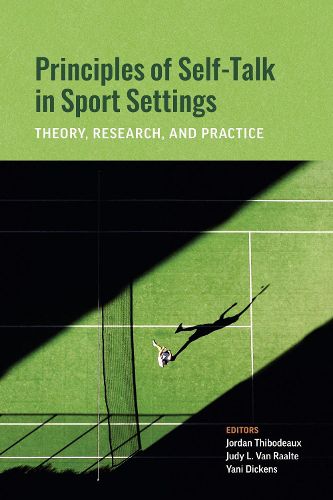Readings Newsletter
Become a Readings Member to make your shopping experience even easier.
Sign in or sign up for free!
You’re not far away from qualifying for FREE standard shipping within Australia
You’ve qualified for FREE standard shipping within Australia
The cart is loading…






This book examines the theory and practice of self-talk in sports performance, with a special emphasis on approaches that move beyond linear, cognitively-focused understandings of self-talk.
Self-talk generally begins when children are 2-3 years of age and continues into adulthood, as people talk to themselves both internally and out loud. Self-talk has drawn the interest of sport psychology professionals, researchers, athletes, and coaches who are eager to understand the origins and correlates of self-talk, how self-talk affects them, and how self-talk can be used to enhance sport performance.
Starting from a strong theoretical foundation and addressing self-talk in sport myths, this volume moves on to one of the greatest challenges in sport self-talk literature, the crisis of validity of self-talk measurement tools, and provides direction and examples of valid and reliable tools for sport self-talk research. Chapters bring together authors from diverse theoretical backgrounds and fields, and offer tools for coaches and mental health providers to measure self-talk, and examine different approaches to self-talk, including ecological and embodied cognition, and draw important links between self-talk and other areas of cognitive functioning, such as emotion regulation.
$9.00 standard shipping within Australia
FREE standard shipping within Australia for orders over $100.00
Express & International shipping calculated at checkout
This book examines the theory and practice of self-talk in sports performance, with a special emphasis on approaches that move beyond linear, cognitively-focused understandings of self-talk.
Self-talk generally begins when children are 2-3 years of age and continues into adulthood, as people talk to themselves both internally and out loud. Self-talk has drawn the interest of sport psychology professionals, researchers, athletes, and coaches who are eager to understand the origins and correlates of self-talk, how self-talk affects them, and how self-talk can be used to enhance sport performance.
Starting from a strong theoretical foundation and addressing self-talk in sport myths, this volume moves on to one of the greatest challenges in sport self-talk literature, the crisis of validity of self-talk measurement tools, and provides direction and examples of valid and reliable tools for sport self-talk research. Chapters bring together authors from diverse theoretical backgrounds and fields, and offer tools for coaches and mental health providers to measure self-talk, and examine different approaches to self-talk, including ecological and embodied cognition, and draw important links between self-talk and other areas of cognitive functioning, such as emotion regulation.